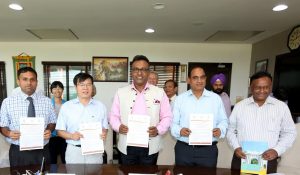New Delh; The Jindal School of Liberal Arts and Humanities (JSLH) in collaboration with the Institute of Chinese Studies (ICS) and the India International Centre (IIC) organized a stimulating discussion on the theme of ‘Complex Belongings: The Chinese Indian Community‘. The forum was held in New Delhi and was chaired by Tansen Sen- Professor of History and the Director of the Center for Global Asia at NYU Shanghai, and Global Network Professor at NYU in New York.
The discourse was a retreat into the history of Chinese the community and their origin in India. The aim of the event was not only to understand the history and vicissitudes of the Chinese-Indians as they created neighbourhoods, religious spaces, and social and cultural networks in India, but also to examine the present condition of those still residing in India.
The insightful conversations deepened the understanding of existence of Chinese roots in India by highlighting the topics like Miniscule Minorities and the Imagination of Citizenship, Migration and Shifting Notions of Home, Victims of War: The Uprooting of a Society, Chinese Indians or Indian Chinese? – The ‘Returnees’, Memory, Identity and Diaspora: A Discussion on the Indian Chinese Cuisine in Kolkata and the Chinese Indian Conundrum: Being a Chinese Indian Today and Tomorrow.
While leading the discussion, Tansen Sen, professor of history and the Director of the Center for Global Asia at NYU Shanghai, said “The history of Chinese migration starts around 12th Century but ‘Who is Chinese’ still remains a complicated question. The Chinese community in India mostly migrated from Southern China in search of work starting in the late eighteenth century [in British and Dutch colonies]. The India-China war of 1962 led to the deportation of thousands of Chinese, many of whom were separated from their families. There is a lot which is yet to come to the fore about the Chinese community in India and platforms such as these prove to be instrumental in underlining the key issues, many of them still exist. Ironically, Chinese have many places to belong to, but they can call no place as their own.”
The event also witnessed the screening of the multiple award-winning documentary called ‘The Legend of Fat Mama’, directed by Mr. Rafeeq Ellias. The movie portrays the trauma of incarceration and deportation of Chinese families after India-China war in 1962.
Focusing on migration and shifting notions of home, Jayani Bonnerjee, Associate Professor, Jindal School of Liberal Arts and Humanities, said “We have been talking of complex belongings and the idea of home is intricately related to it. In my research, I have focused on trying to understand the idea of home through connections between Anglo-Indian and Chinese communities. The question of home also raises questions of unhomeliness.”
Professor Lawrence Liang, Professor of Law, Governance and Citizenship at the Ambedkar University, New Delhi spoke about the small number, Chinese minority trapped inside the bigger numbers, the population and socio-cultural fabric of the country.
The occasion was graced by fellow panellists like Professor Rita Chowdhury, Director of National Book Trust, India, Ms Sevein Kuok, a PHD scholar from JNU and Piya Chakraborty, a PHD research scholar from Shiv Nadar University India and Bean Ching Law, a third generation Chinese-Indian, Managing Trustee of some of the heritage Chinese Buddhist and Confucian temples in Kolkata.
The discussion brought together some of the leading scholars, authors, experts and community members to analyze the issues of identity, memories, and the future of a community that has been largely forgotten in history and in the politics of nation-states.

